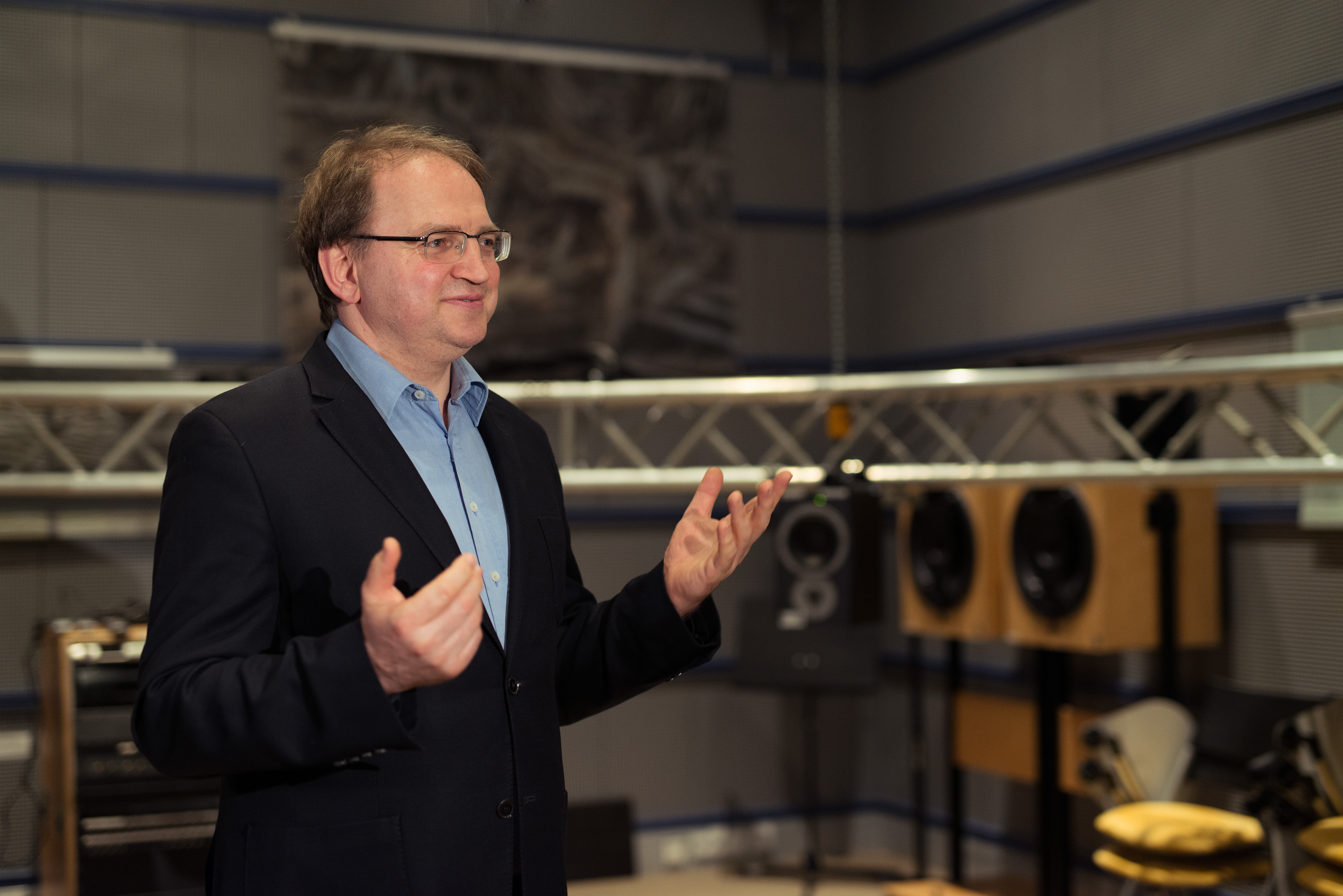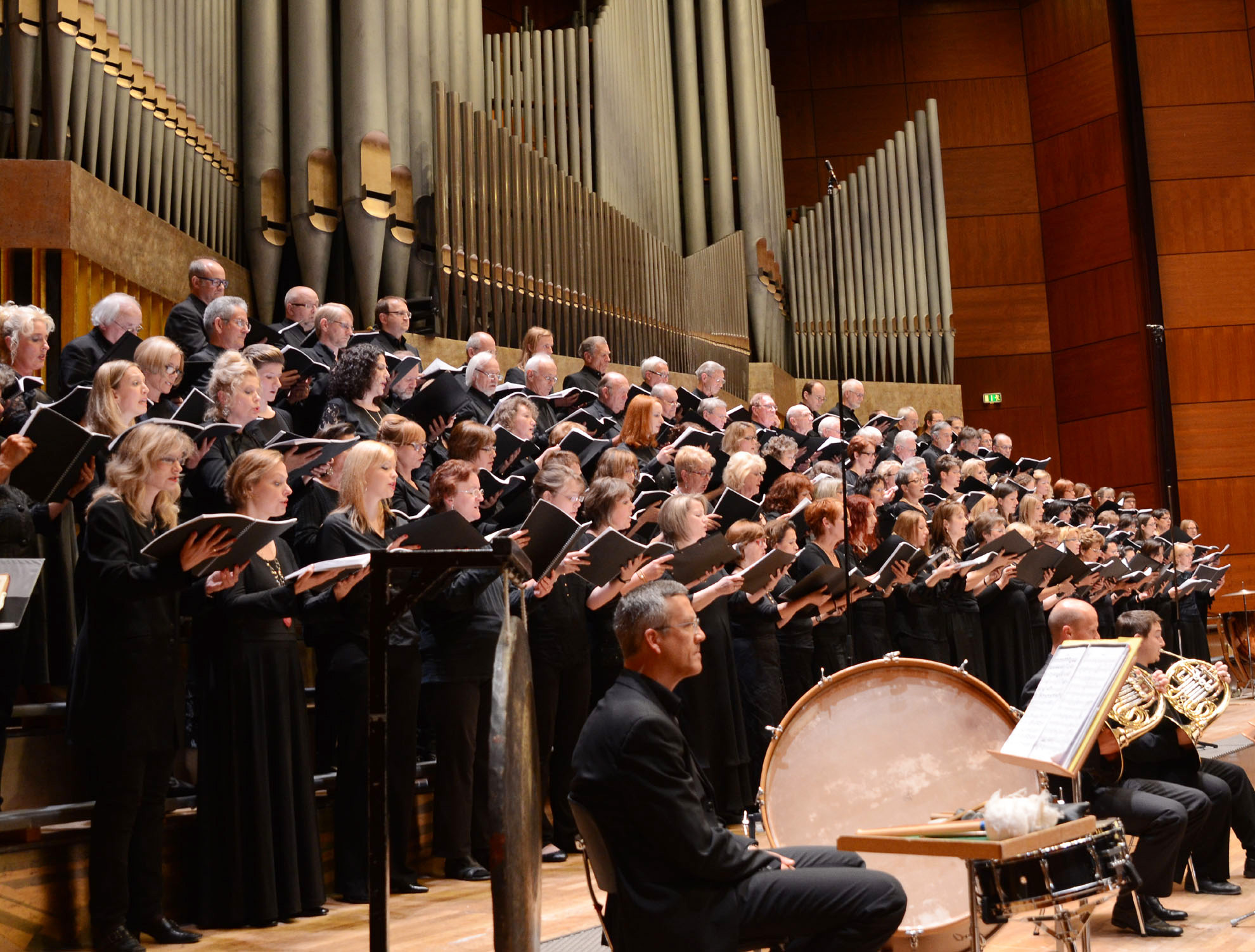„The positive work environment and being together with long-standing colleagues mean a lot to me”, explains Dr. Bernhard Grill, director and division head at Fraunhofer IIS. Grill has been at the institute since the early days and played a key part in its rise from the level of a working group to become a world-renowned research institute. He has also been a member of the institute’s management team since 2016. We asked him about his professional responsibilities and his most special places away from work.
“Fraunhofer IIS is definitely a special place“
23.6.2017 | Interview with: Dr. Bernhard Grill

What are your main responsibilities?
My main role is still to manage the Audio and Media Technologies Division, with its nine departments, and to supervise the AudioLabs. Here, we want to ensure the broadest possible foundation with the soundest possible funding from a wide range of sources. In addition to the AAC codec family, which is still hugely significant and can be found in every mobile phone, TV or web browser, we are currently working on several promising new projects. For one, there is the new EVS (Enhanced Voice Services) mobile telephony voice codec, which is well on the way to bringing the still very modest speech quality of mobile phones up to hi-fi level. In developing the new MPEG-H standard, we are also involved in a global competition for the future of TV sound. May 2017 has seen MPEG-H enter regular operation in South Korea in the first system of its kind. The plan is then to transmit the Winter Olympic Games with interactive and all-enveloping 3D sound in 2018.
What is your typical working day like?
Being a director at the institute comes with a lot of obligations. You have to maintain a presence at a political level, on the Executive Board, and on various committees. In terms of internal work, it’s important to understand what is going on in the various projects at any time, and to hope that everything will keep ticking over without my involvement (he laughs). The crucial thing is that we have a large number of people involved, who act autonomously wherever possible. This means I have to pay more attention to where new developments are emerging and to where I can support that process. My day-to-day business also includes administrative tasks, such as approvals for patent applications or authorizing business trips.
Our external relations are my other key responsibility. We have staff all over the globe – even in Australia. There are also a surprisingly large number of legal issues. I would never have imagined that, as an engineer, I would end up having to deal with lawyers quite so often. But it’s essential if you are doing something that could actually have very significant consequences.
What do you like most about your work?
We have many opportunities to shape things and to set things in motion, and I get to see how things progress. For example, we began the preliminary work on EVS voice encoding in 2006. Even as far back as 1994, when I first thought about doing a doctorate, we were thinking about amalgamating the areas of speech and audio coding. At that time, the application was rejected by the reviewers at the German Research Foundation (DFG). Indeed, for a long time, no one in the world managed to achieve this. However, the team we assembled in 2006 had some encouraging initial successes in 2008/2009. Now, having pursued this area for 20 years, we have found a solution. This is something I’m delighted with and that gives me a certain sense of satisfaction. If someone says it can’t be done, to me this simply means “not yet”. You can say that, ten years ago, we were still totally unheard of in the field of speech coding and had to start from scratch, whereas now we are right at the forefront and have the best people in the world. That’s a wonderful thing.
"One of our goals has always been to win engineering competitions."
Hint: starting the video will submit data to youtube.
How have your responsibilities changed since you became director?
There is significantly more politics involved now, but I’ve always been open to that – at school, I did extension courses in physics and history/social studies. Human coexistence and interaction is a complicated thing, easily rivaling the complexity of problems in mathematics or physics.
What news headlines would you like to read about Fraunhofer IIS over the next year?
EVS is already showing huge potential, and it would be great if it went on to be used for all telephone calls in the future. At present, we have between ten million and a hundred million users. That’s not bad, but EVS isn’t yet the standard technology for mobile phones, so if we could get to that stage, that would really be something.
What – apart from your work – is important to you in life?
I have five children – that’s a whole other story. And then there’s music. I used to be a serious trumpeter and played in professional groups. My aim was to find a job related to music. Things looked good at the start with the development of MP3, but then I had to scale back on the four/five hours of practice a day and was away a lot, traveling all over the world. This simply wasn’t compatible with playing the trumpet, so I had to give up any intention of pursuing that seriously. Instead I’ve been singing in the Nuremberg Philharmonic Choir for a few years, which is a great way to balance things out and something I really enjoy.
Looking back, what has made the biggest mark on you at Fraunhofer IIS?
My colleagues were and still are an important factor, especially those from the early days. We are united by a basic understanding that we work together, that we achieve more together than separately, and that everyone has their eye on the bigger picture. Another advantage is the way the institute is organized, so that the final decision-making body is within the institute itself. We are not dependent on a head office, possibly located in another part of the world, that struggles to understand what’s happening on the ground.
What is special about Fraunhofer?
To conduct research and to assert yourself on the market at the same time is quite a unique combination, and that is the challenge I set myself as a director. The question is: How can you manage to introduce a product-based perspective while maintaining Fraunhofer’s character? For example, we have introduced product management and other typical corporate procedures into the Audio and Media Technologies Division, so that staff can now undergo training to become a product manager, for example. In this way, decisions incorporate more of an outside perspective, and we should be more successful at combining research with the development of new products. Interestingly, IIS is seen as leading the way for other Fraunhofer Institutes in this respect.
Do you have any personal items in the office?
It’s not something physical, but on the computer I have the pieces of music from the early days, which we’ve heard thousands of times. And I always try to have some fruit in the office.
